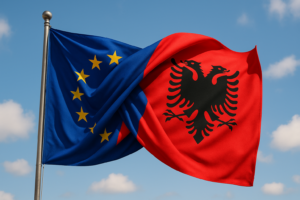Headquarters: Svetog Nauma 7, 11000
Office address: Đorđa Vajferta 13, 11000
Phone:: +381 11 4529 323

After the 2018 Sofia Summit and the 2020 Zagreb Summit, came the 2021 Brdo Summit – organised by Slovenia, which it labelled as one of its key milestones during its Council Presidency. Although EU-Western Balkan Summits typically produce excitement among those stakeholders closely following the EU enlargement policy, defined by hope that events of this kind can act as critical junctures to the enlargement impasse, the latest Summit appears to have been instead followed by a high dose of scepticism, or even indifference. Such underwhelming feelings stem from the fact that the previous summits failed to result in the accumulation of substantial political will, both on the EU and WB sides, to renew the entire process. Despite the low expectations which were based on the anticipation of cosmetic changes from one declaration to another, this paper argues that the Brdo Declaration did make subtle but important changes in the way it addressed the EU’s enlargement to the Western Balkans.
By taking a quick look at the Brdo declaration, nothing really stands out; yet, by taking a closer look and by comparing it to the Zagreb declaration, a few things pop out as quite relevant and novel. The key difference lies in the fact that the 2021 declaration explicitly states its commitment to the ‘enlargement process’. Although this might not seem like a big deal, it in fact is, as the 2020 declaration limited its ambitions simply by saying that the EU reaffirms its unequivocal support for the “European perspective” of the region. Considering that enlargement is far from being a popular policy among member states, the fact that all 27 of them managed to unanimously agree on the necessity to highlight the word ‘enlargement’ in article 1 is quite encouraging. Previously, the civil society of the region was quite disappointed by the fact that the EU kept referring to vague terms such as ‘EU perspective’. The change made in 2021 indicates that the EU may have realised that empty words (and promises) won’t do the work if the goal of the EU is indeed to maintain full membership as a credible option, both in the eyes of the political elites and citizens of the region.
Higher prioritisation of key structural issues in the Western Balkans is another aspect which made the 2021 declaration stand out. In the past few years, civil society in the region has been quite vocal about the fact that the reforms in the areas of democracy and the rule of law are all but comprehensive and tangible. This particularly applies to Serbia, which the Freedom House ‘Nations in Transit’ Report labelled in 2020 as a hybrid regime, although it was a semi-consolidated democracy at the time it started its accession talks with the EU in 2014. In that regard, the EU’s prioritisation levelled-up as the 2021 mentions “the primacy of democracy, fundamental rights, and the rule of law” in article 2, i.e., at the very top of the Declaration. This may indeed be considered as a step-up in the EU’s efforts to be more vocal about the aforementioned areas, as the 2020 Declaration addressed the same thing as late as article 7.
Similarly, the EU prioritised in a stronger manner the necessity of the governments from the region to recognise the Union as the region’s “closest partner, main investor, and principal donor”. Not only is this visible in the fact that this was stressed out in article 3 (while before it was article 5), but it is even more noticeable by taking a look at how this was demanded. Unlike the 2020 Declaration, which simply states that the EU’s overwhelming assistance “deserves public acknowledgement”, the 2021 Declaration changes tone considerably by stating that its unprecedented scale and range of provided support “must be fully recognised” and conveyed by EU partners in their public debate and communication. The why this was demanded is quite obvious – it was due to the fact that external actors such as China have been getting over-the-top messages and gestures of praise in Serbia, which has resulted in the side-lining of the EU’s assistance. The fact that public opinion now believes that China has been the biggest donor to Serbia during the COVID-19 pandemic explains well why the EU is eager to step up its game when it comes to fighting for the “hearts and minds” of the local population.
In a nutshell, the 2021 Declaration went far beyond the original expectations that the EU “can no longer agree to give a guarantee of future membership” to the Western Balkan states. In that regard, the Slovenian presidency should be commended for doing a highly valuable job in organising such a summit in the midst of the pandemic, all the while managing to convince 27 member states to agree on subtle, but nevertheless important changes when compared to the previous practice. With such surprising readiness from member states to be more explicit when it comes to prioritising enlargement, rule of law, and the fight for the ‘hearts and minds’ of citizens, they might perhaps consider the latest promising and increasingly popular cross-European idea for boosting enlargement by granting gradual access to rights and obligations to those who meet stringent conditions – i.e., the model of staged accession. As the next EU-WB summit is already scheduled for 2022, the EU should build upon the latest Declaration and take steps forward.
Photo > European Commission